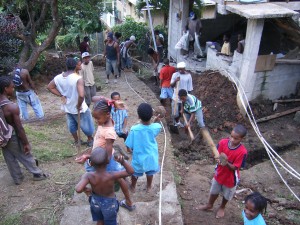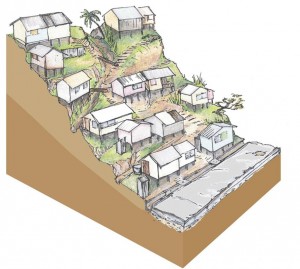Getting started

Starting a MoSSaiC intervention requires an appreciation of the nature of urban landslide hazard risk accumulation, creation of teams and tasks to deliver the program, identification of milestones, a robust community selection process, and an understanding of the required project safeguards.
The general selection criteria for appropriate community hillsides for interventions, for which drainage solutions (surface water drains and roof-water capture) might reduce landslide risk, and be potentially cost-effective for a number of houses, can be given as:
- Communities located on hillsides typically having overall slope angles in the range 20 – 50 degrees
- Slope instability is rotational or translational landslides
- Hillsopes comprise weathered materials (soils)
- A combination of rainfall and/or surface water is the instability triggering mechansim
- Housing density typically 40-70%
- History of a significant number of houses damaged or destroyed by landslides
Increased drainage provision and surface water management can reduce landslide hazard, by increasing the triggering threshold recurrence interval of the rainfall ; for which our book provides a flexible blueprint. While the majority of the text is, of necessity, devoted to the details of delivering on-the-ground mitigation measures, equal weight should be given to evidence of performance of the measures (physical and cost-effectiveness), and to the longer-term outcomes and behavioral change achieved as a result

